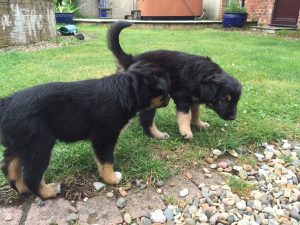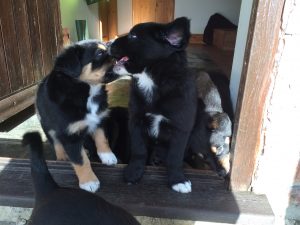When To Start Puppy Training.
There was an old idea that puppies shouldn’t start training until they were six months old. However, we now know much more about how dogs learn. In addition, improvement in vaccination schedules means puppies are usually safe to go out into public places by around 16 weeks of age. In this article, Holidays4Dogs provides further information on early puppy training and socialisation.
 Puppies are capable of learning from a very early age. Over the past few decades, much has been learnt about the importance of training and socialisation of young puppies. We now know that puppy training can start, as soon as a puppy is brought home from the breeder.
Puppies are capable of learning from a very early age. Over the past few decades, much has been learnt about the importance of training and socialisation of young puppies. We now know that puppy training can start, as soon as a puppy is brought home from the breeder.
Puppies must be brought up understanding that certain behaviours are good, rather than being punished for doing the ‘wrong’ thing.
In a pup’s mind, some behaviours, which we may regard as being bad, are just normal canine behaviours. Chewing and biting, for instance, is how puppies learn about their environment.
Here are four things you can teach your new pup straight away:
Housetraining.
The details of how to go about house training your puppy can be found in another of our Holidays4Dogs articles. The main thing to remember is that your pup will need constant supervision. NEVER scold your puppy for accidents in the house. Give loads of praise when they perform in the right place. For information about submissive urination in dogs, you can read more in our other article here.
Name.
This is an obvious one, but can begin as soon as you get your puppy home – as long as you can decide on a name! Keep using your pup’s name and whenever they look or turn towards you, reward them lavishly. The young puppy will quickly understand their name means you want their attention.
Bite inhibition.
As we have pointed out, puppies explore the world around them using their mouths. Unfortunately, this can mean their very sharp teeth can hurt human skin. Should this happen, let out a loud yelp and remove your hand, (or foot) away from the puppy. Offer the puppy something he IS allowed to chew. If they don’t calm down, separate yourself from the pup for a minute or two, and see if this encourages them to settle.
Basic training.
Puppies can learn quite complex things even at a young age, so there is every reason to start puppy training as soon as possible. To being with, however, keep it simple. Focus on things like ‘sit’ and ‘down’. Use food, or toys, to lure your pup into position. Praise as soon as their bottom hits the floor. You can also begin to teach recall, (using his name). Have plenty of toys and treats at the ready, to encourage the puppy to come to you.
Training puppies is very rewarding, (if at times a little frustrating). While you should certainly begin this as soon as you bring your new puppy home, it is equally important not to overwhelm him, or her. Try not to move too quickly onto more complicated behaviours.
Stick with the basics for a few weeks and make sure your pup understands these before trying new things.
Clicker training is a brilliant way to train young puppies, but keep sessions short and allow plenty of downtime. Sometimes, you may find it is a case of two steps forward and three steps back. However, the sooner you start puppy training, the sooner you will see results.
However, if you can remain consistent and patient, you will soon see your puppy developing into a clever adult.
While puppy socialisation and training is important, its also crucial not to over tire your new puppy with rigorous exercise and long walks.
You can read about puppy socialisation and how to go about it in another of our Holidays4Dogs articles.


